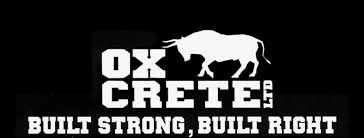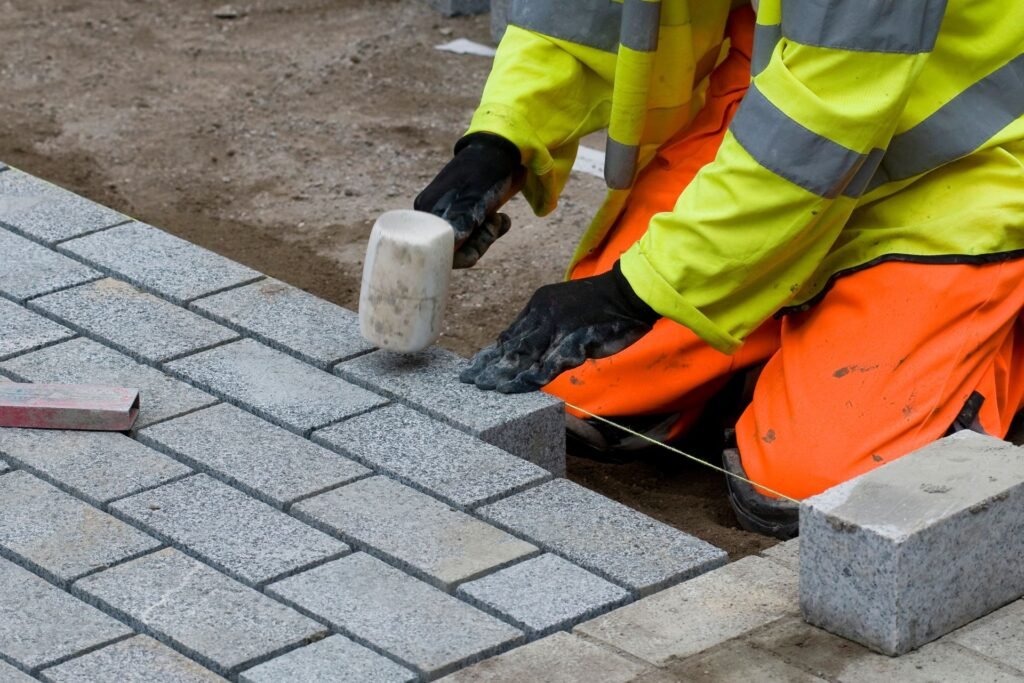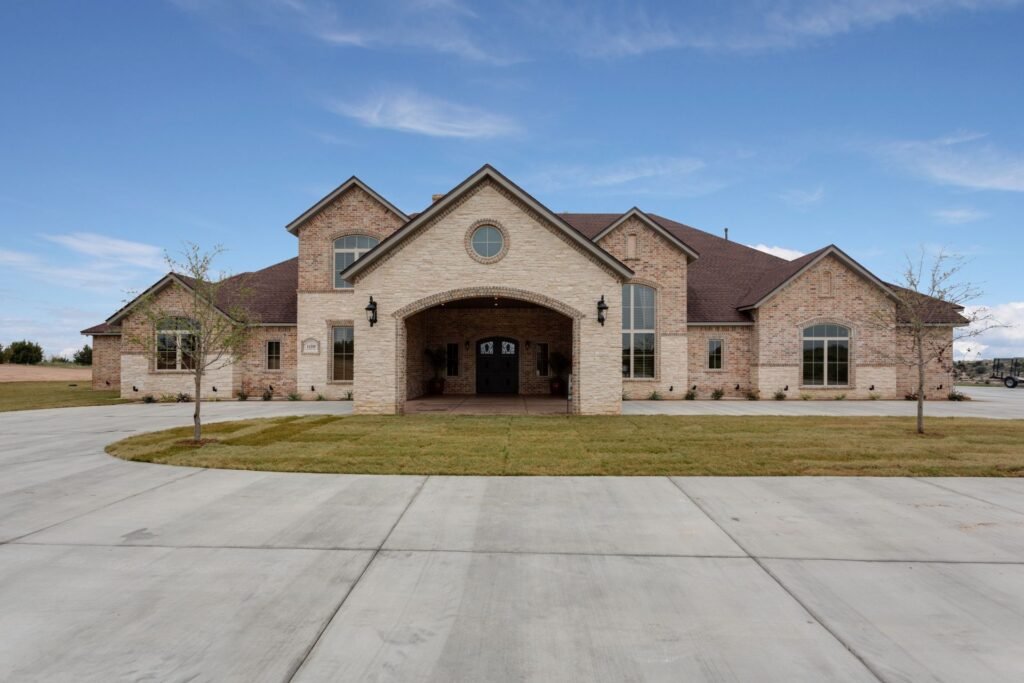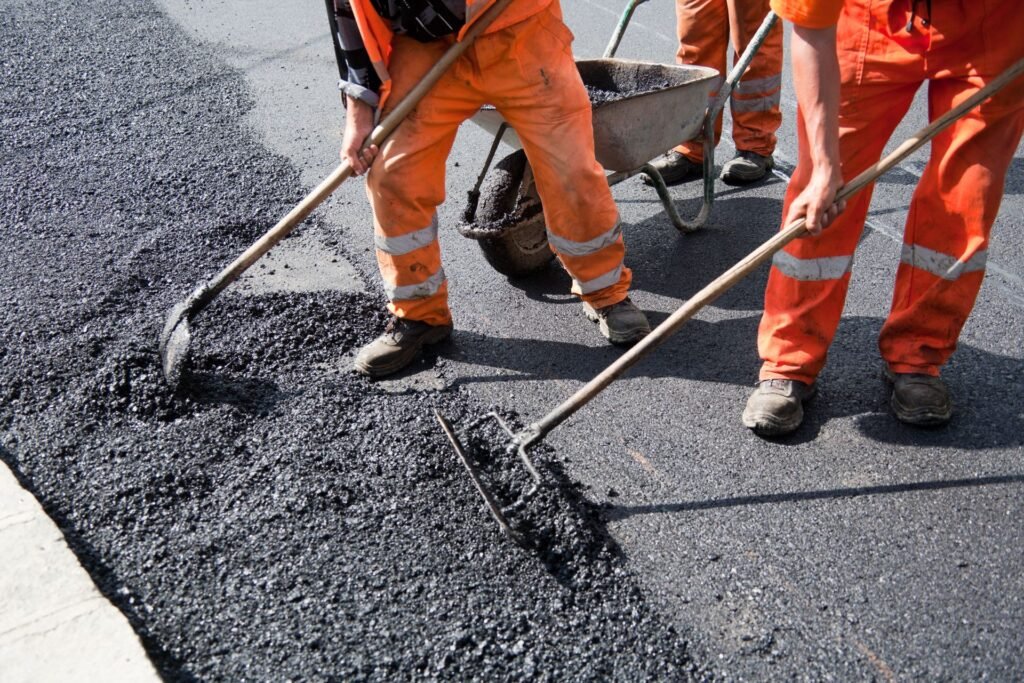Welcome to our comprehensive guide on the cost of paving services in New Zealand, where we delve into everything you need to know about planning and budgeting for your next paving project. Whether you’re considering paving your driveway, creating a beautiful patio, or upgrading a commercial parking lot, understanding the various factors that influence costs is crucial. In this post, we’ll explore the different types of paving materials, discuss the typical expenses associated with residential and commercial projects, and provide practical tips to help you make informed decisions. Let’s embark on this journey to ensure you achieve a durable, aesthetically pleasing, and cost-effective paving solution tailored to your needs.
On average, the cost of paving services in New Zealand ranges from $50 to $150 per square meter for asphalt, $60 to $200 for concrete, and $70 to $220 for pavers. These costs can vary based on factors such as material choice, project size, and site preparation. For commercial projects, expenses are typically higher due to larger areas and more complex requirements. To save on costs, consider selecting the right material, planning efficiently, and hiring a reputable contractor.
Table of Contents
Overview Of Paving Services
Types of Paving Services
Paving services are crucial for both residential and commercial properties, providing functional and aesthetic benefits. Here’s an in-depth look at the various types of paving services available:
- Driveways: Driveways are one of the most common paving projects. A well-paved driveway not only enhances curb appeal but also provides a smooth and durable surface for vehicles. Whether you prefer the sleek look of asphalt or the traditional appeal of concrete, there are numerous options to suit your needs.
- Pathways: Pathways add a touch of elegance and practicality to gardens and yards. They guide foot traffic and can be designed in various patterns and materials to complement your landscape. Popular choices include stone pavers for a natural look or concrete for a more modern finish.
- Patios: A beautifully paved patio extends your living space into the outdoors, perfect for entertaining or relaxing. Patios can be crafted from a variety of materials like brick, stone, or concrete, allowing for endless design possibilities that match your style and the architectural design of your home.
- Commercial Parking Lots: For businesses, a well-maintained parking lot is essential. It ensures safety for customers and employees while enhancing the overall appearance of the commercial property. Asphalt is a popular choice for commercial parking lots due to its durability and cost-effectiveness, but concrete is also a viable option for long-lasting performance.
Common Paving Materials
Choosing the right material is vital for the longevity and appearance of your paving project. Here are some common paving materials and their benefits:
- Asphalt: Asphalt is a preferred choice for many driveways and parking lots due to its affordability and quick installation process. It provides a smooth, durable surface that can withstand heavy traffic. Additionally, asphalt is relatively easy to repair, making it a practical option for many homeowners and businesses.
- Concrete: Concrete is known for its strength and longevity. It’s a versatile material that can be used for driveways, pathways, patios, and more. Concrete can be stamped or colored to mimic the look of more expensive materials like stone or brick, offering a high-end appearance without the high-end cost.
- Pavers (Brick, Stone, etc.): Pavers are a popular choice for those looking to create intricate designs and patterns. Available in various materials such as brick and stone, pavers are durable and can add a unique aesthetic to your property. They are ideal for patios, pathways, and driveways, offering a wide range of colors and textures to choose from.
- Gravel: Gravel is an economical and easy-to-install option for driveways and pathways. While it may not offer the smoothest surface, it provides excellent drainage and is available in various sizes and colors to match your landscaping. Gravel can be a great choice for rural or rustic settings where a more natural look is desired.
Understanding the different types of paving services and materials can help you make an informed decision for your next project. Whether you’re looking to pave a driveway, create a beautiful patio, or maintain a commercial parking lot, there are plenty of options to suit your needs and budget. Investing in quality paving not only enhances the aesthetic appeal of your property but also ensures safety and functionality for years to come.
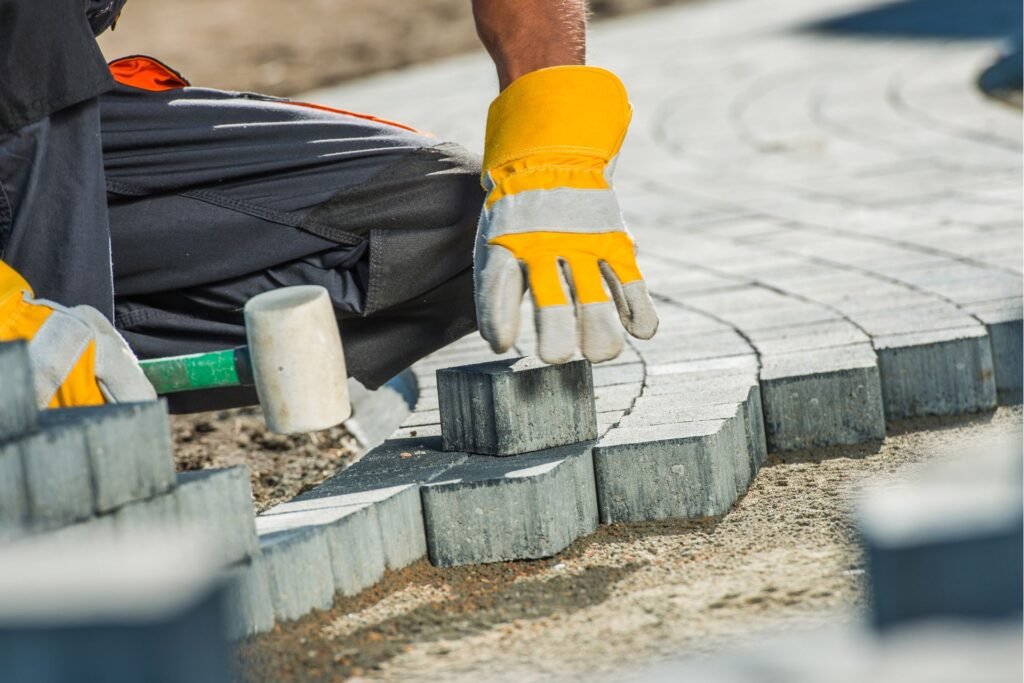
Factors Influencing The Cost Of Paving Services
When it comes to paving services, several factors can significantly influence the overall cost. Understanding these variables can help you budget more accurately and make informed decisions for your project. Here, we break down the key elements that affect paving costs:
Material Costs
One of the most significant contributors to the cost of paving services is the choice of materials. Each type of material has its unique price range and suitability for different applications:
- Asphalt: Generally, asphalt is a cost-effective option for paving large areas, such as driveways and parking lots. It’s durable and relatively easy to maintain but may require periodic sealing to extend its lifespan.
- Concrete: Known for its durability and versatility, concrete can be used for a variety of paving projects. It typically costs more than asphalt but offers a longer lifespan and a range of finish options, including stamped or colored concrete.
- Pavers: Paving stones come in various shapes, sizes, and materials, including brick, stone, and concrete. They offer a high-end look and are ideal for patios, walkways, and driveways. However, they can be more expensive to install due to the labor-intensive process.
- Gravel: For those on a tight budget, gravel can be a suitable option. It’s easy to install and maintain, making it a popular choice for rural driveways and pathways. However, it may not provide the same level of durability or aesthetic appeal as other materials.
Size and Scope of the Project
The size and complexity of your paving project will also play a crucial role in determining the cost. Generally, larger projects cost more, but the cost per square meter can decrease with scale due to economies of scale.
- Residential vs. Commercial Projects: Residential projects tend to be smaller and simpler, often involving driveways, patios, or walkways. Commercial projects, on the other hand, can include parking lots, roads, and large plazas, which require more materials and labor.
- Typical Square Meter Costs: The cost per square meter can vary based on the material and project scope. For instance, asphalt paving might cost between $30 to $50 per square meter, while concrete could range from $60 to $100 per square meter. Paving stones and custom finishes can significantly increase these rates.
Site Preparation
Proper site preparation is essential for ensuring a durable and long-lasting paving job. This phase includes several critical tasks that can affect the overall cost:
- Excavation and Grading: Before paving, the site needs to be excavated and graded to provide a stable foundation. This process involves removing existing materials, leveling the ground, and compacting the soil, which can be labor-intensive and costly.
- Drainage Considerations: Proper drainage is crucial to prevent water pooling and damage to the paved surface. Installing drainage systems or grading the site to ensure water runoff can add to the overall cost.
Labor Costs
Labor is another significant factor in the cost of paving services. The complexity of the project and the skill level required can influence labor costs:
- Average Hourly Rates: In New Zealand, the average hourly rate for paving professionals can range from $25 to $45. Highly skilled workers or those specializing in intricate designs and finishes may charge more.
- Impact of Project Complexity: More complex projects, such as those involving intricate patterns, custom designs, or challenging site conditions, will require more labor hours and higher costs.
Additional Features and Customization
Finally, adding extra features or customizing your paving project can increase the overall cost. These enhancements can significantly improve the aesthetic appeal and functionality of your paved area:
- Decorative Finishes: Stamped, colored, or textured finishes can transform a standard paved surface into a visually stunning feature. However, these decorative options often come at a premium.
- Edging and Borders: Adding edging or borders to your paved area can provide a polished look and help contain the paving material. Materials for edging can include brick, stone, or metal, each with varying costs.
- Lighting and Other Enhancements: Incorporating lighting into your paving project can enhance safety and ambiance. Solar lights, embedded LEDs, or traditional lamp posts can add to the overall expense but offer significant benefits.
In conclusion, the cost of paving services is influenced by a combination of material choices, project size, site preparation, labor, and additional features. By considering these factors, you can better plan and budget for your paving project, ensuring it meets your needs and preferences.
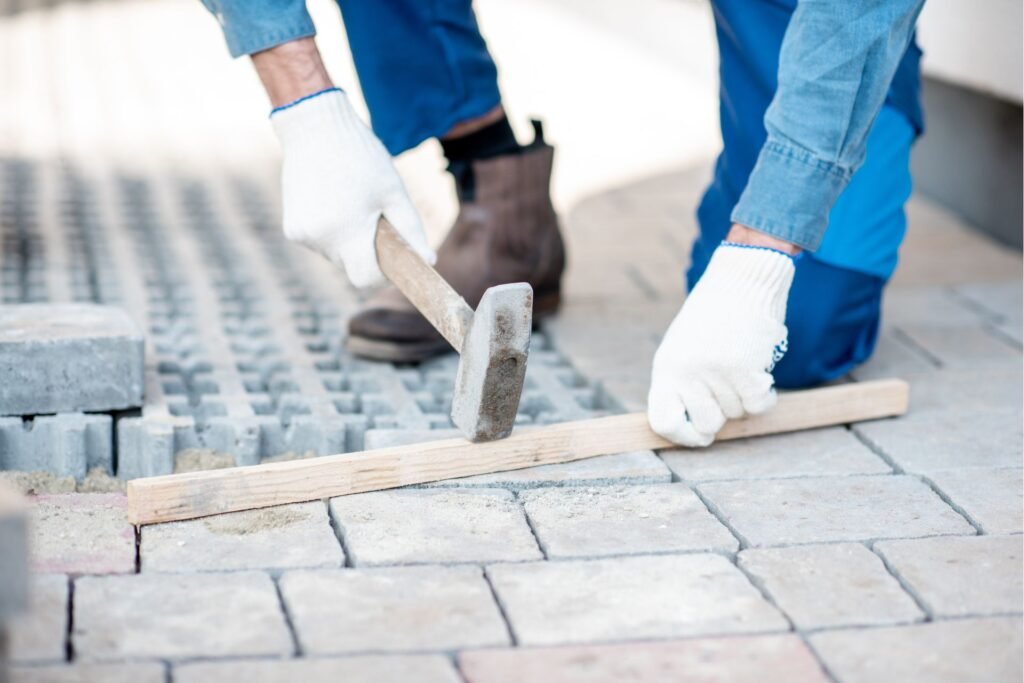
Average Cost Estimates For Paving Services In NZ
When considering paving services in New Zealand, understanding the average cost estimates is crucial. Whether you’re planning a residential driveway or a commercial parking lot, the costs can vary significantly based on materials, design complexity, and project size. Below, we delve into the average costs associated with various paving projects to give you a clear picture of what to expect.
Residential Paving Projects
Driveways: Breakdown of Costs for Asphalt, Concrete, and Pavers
Driveways are a common paving project for residential properties, and the costs can differ based on the chosen material.
- Asphalt Driveways: Asphalt is a popular choice for driveways due to its affordability and durability. On average, you can expect to pay between NZD 60 to NZD 100 per square meter. This includes the cost of materials, labor, and site preparation. Asphalt driveways typically require resealing every few years to maintain their condition, adding to the long-term costs.
- Concrete Driveways: Concrete is a more durable but also more expensive option. The average cost for a concrete driveway in New Zealand ranges from NZD 80 to NZD 150 per square meter. This price includes materials, labor, and the necessary groundwork. Decorative finishes, such as stamping or coloring, can increase the overall cost.
- Paver Driveways: Pavers offer a high-end look with a variety of design options. The cost for paver driveways can vary widely based on the type of pavers used. On average, expect to pay between NZD 100 to NZD 200 per square meter. While more expensive, pavers are highly durable and can be easily repaired by replacing individual stones.
Pathways and Patios: Cost Comparison by Material and Design Complexity
Pathways and patios enhance the aesthetic and functional value of a home. The costs for these projects depend on the material and the complexity of the design.
- Gravel Pathways: Gravel is the most cost-effective option, with prices ranging from NZD 30 to NZD 60 per square meter. It’s easy to install and maintain but may require frequent replenishment.
- Concrete Pathways and Patios: Concrete remains a popular choice due to its durability. The cost for concrete pathways and patios is similar to that of driveways, ranging from NZD 80 to NZD 150 per square meter. Adding decorative elements or complex designs can increase the cost.
- Stone Paver Pathways and Patios: Stone pavers offer a premium look and feel. Depending on the type of stone and the intricacy of the design, costs can range from NZD 120 to NZD 250 per square meter. This option is durable and can significantly boost the property’s value.
Commercial Paving Projects
Parking Lots: Costs for Different Materials and Sizes
Commercial parking lots require robust materials to withstand heavy traffic and usage. The costs vary based on the material and the size of the parking lot.
- Asphalt Parking Lots: Asphalt is commonly used for commercial parking lots due to its cost-effectiveness and quick installation. The average cost for asphalt parking lots is between NZD 70 to NZD 120 per square meter. Maintenance costs, such as resealing and repairs, should also be considered.
- Concrete Parking Lots: Concrete provides a long-lasting solution with minimal maintenance. The cost for concrete parking lots ranges from NZD 100 to NZD 160 per square meter. Despite the higher initial cost, the durability of concrete makes it a cost-effective choice in the long run.
Access Roads: Estimations Based on Material and Traffic Load
Access roads are critical for commercial properties and must be designed to handle various traffic loads. The material and expected traffic significantly influence the cost.
- Gravel Access Roads: For low-traffic areas, gravel can be a cost-effective solution, costing between NZD 40 to NZD 80 per square meter. However, regular maintenance is required to keep the road in good condition.
- Asphalt Access Roads: Asphalt is suitable for moderate to heavy traffic and costs between NZD 70 to NZD 110 per square meter. It provides a smooth surface and requires periodic maintenance.
- Concrete Access Roads: Concrete is ideal for high-traffic areas due to its strength and longevity. The cost for concrete access roads ranges from NZD 100 to NZD 150 per square meter. Though more expensive, concrete requires less frequent maintenance, making it a viable option for long-term use.
In conclusion, the cost of paving services in New Zealand varies based on the project type, material choice, and design complexity. By understanding these factors, you can make informed decisions and budget effectively for your paving project.
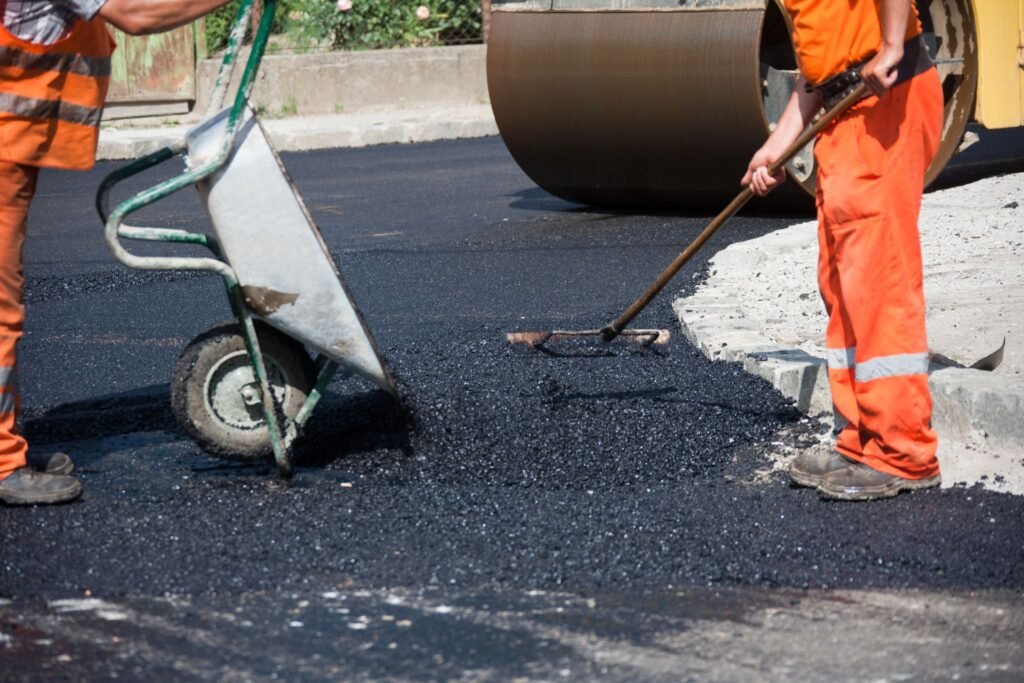
Cost-Saving Tips For Paving Projects
When undertaking a paving project, managing costs without compromising quality is crucial. Here are some practical tips to help you save money while ensuring your project stands the test of time.
Choosing the Right Material
Selecting the appropriate material for your paving project can significantly impact your budget and the longevity of your paving. Here’s a look at the pros and cons of some popular options:
1. Concrete
- Pros: Durable, low maintenance, and offers a clean, modern look. Suitable for high-traffic areas.
- Cons: Higher upfront cost and can crack over time without proper installation.
2. Asphalt
- Pros: Generally cheaper than concrete, quick to install, and flexible, reducing the likelihood of cracks.
- Cons: Requires more maintenance, including periodic resealing, and has a shorter lifespan compared to concrete.
3. Pavers
- Pros: Aesthetically versatile with various designs and colors, easy to repair by replacing individual pieces.
- Cons: Can be more expensive in terms of materials and labor, potential for weeds to grow between pavers if not sealed properly.
4. Gravel
- Pros: The most affordable option, easy to install, and excellent for drainage.
- Cons: Requires regular maintenance to keep the gravel in place, less comfortable for walking or driving.
Choosing the right material involves balancing upfront costs with long-term maintenance and durability. For instance, while concrete may have a higher initial cost, its longevity and low maintenance could make it more cost-effective over time.
Efficient Project Planning
Proper planning is essential to minimize waste and reduce costs in any paving project. Here are some strategies:
1. Design and Layout
- Start with a clear design and layout plan. This ensures you purchase the correct amount of materials and avoid unnecessary expenses.
- Consider the natural landscape and existing structures to minimize excavation and grading costs.
2. Material Calculation
- Accurately calculate the materials needed. Overestimating can lead to excess costs, while underestimating can cause delays and increased expenses.
3. Phasing the Project
- If your budget is tight, consider phasing the project. Completing the work in stages can spread out costs over time without compromising the overall quality.
4. Reuse and Recycling
- Where possible, reuse existing materials. For example, repurposing old pavers or asphalt can save money and reduce environmental impact.
- Investigate local recycling facilities for excess materials to avoid disposal fees.
Hiring the Right Contractor
Choosing the right contractor can make a significant difference in the success and cost-efficiency of your paving project. Here’s how to find a reputable contractor in New Zealand:
1. Research and Referrals
- Start by asking for referrals from friends, family, or colleagues who have recently completed paving projects.
- Check online reviews and ratings to get an idea of the contractor’s reputation and reliability.
2. Multiple Quotes
- Obtain at least three quotes from different contractors. This will give you a better understanding of the market rate and help you identify any unusually high or low bids.
3. Licensing and Insurance
- Ensure the contractor is properly licensed and insured. This protects you in case of accidents or substandard work.
- Verify their credentials and memberships in professional organizations, which can indicate a commitment to quality and professionalism.
4. References and Portfolio
- Ask for references from past clients and follow up with them to learn about their experience.
- Review the contractor’s portfolio of completed projects to ensure their style and quality match your expectations.
5. Contract and Warranty
- Get a detailed contract outlining the scope of work, materials to be used, timeline, and payment schedule.
- Check for warranty coverage on both materials and workmanship. A good contractor will stand behind their work and offer guarantees.
By following these tips, you can effectively manage your paving project’s costs without sacrificing quality. Proper material selection, efficient planning, and hiring a reputable contractor are key steps to ensuring a successful and cost-effective paving project.
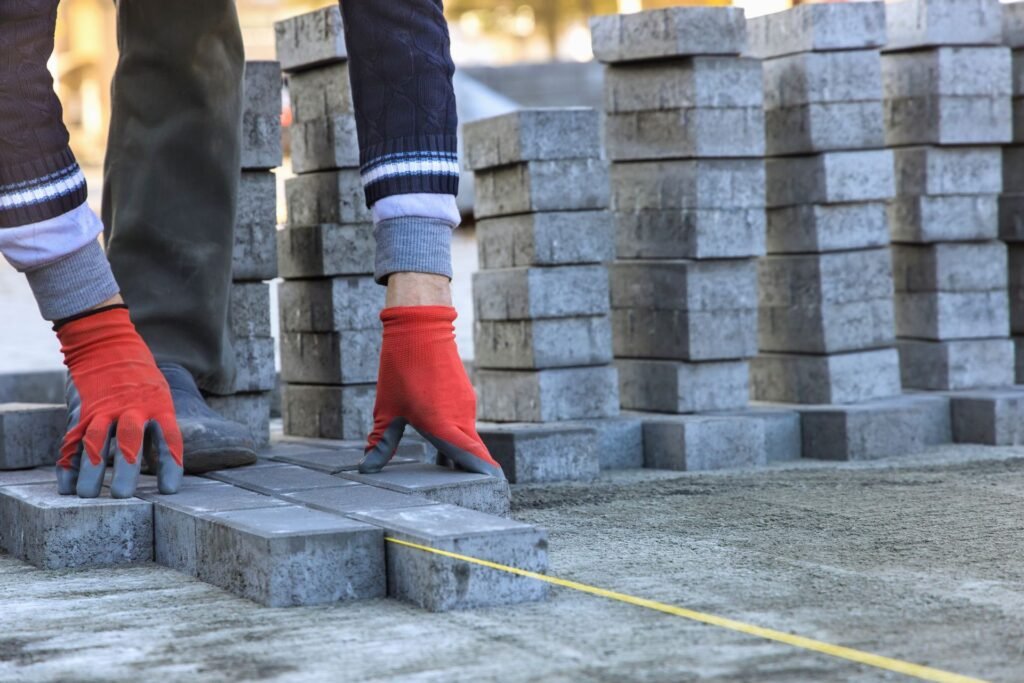
Case Studies And Examples
Residential Case Study
One of the best ways to understand the process and benefits of paving projects is by looking at real-life examples. Let’s dive into a detailed residential case study to see how a typical paving project unfolds, from start to finish, including the costs and outcomes.
Imagine a suburban family home with an old, cracked driveway that needs replacement. The homeowners decide to invest in a new paved driveway to enhance their property’s curb appeal and functionality.
Project Scope
The project involves removing the existing driveway, preparing the site, and installing a new paved driveway. The homeowners chose a popular paving material, such as concrete pavers, known for their durability and aesthetic appeal.
Cost Breakdown
1. Demolition and Removal
- The first step is demolishing the old driveway, which costs around $1,000. This includes breaking up the existing concrete and hauling it away.
2. Site Preparation
- Proper site preparation is crucial for a long-lasting driveway. This involves grading and compacting the soil, adding a gravel base, and ensuring proper drainage. This step costs approximately $1,500.
3. Paving Materials
- Concrete pavers are selected for their durability and attractive appearance. The cost of materials, including pavers, sand, and edging, totals around $3,000.
4. Labor Costs
- Skilled labor is required to lay the pavers correctly. This involves placing the pavers, cutting them to fit, and securing them in place. Labor costs for this project amount to $2,500.
5. Finishing Touches
- To complete the project, the edges are secured, and the surface is sealed to protect against weather and wear. This final step costs approximately $500.
Total Cost
The overall cost of the residential paving project comes to $8,500.
Outcome
The new driveway not only enhances the home’s appearance but also adds value to the property. The homeowners are thrilled with the smooth, attractive surface, which is easier to maintain and provides a safer, more welcoming entrance to their home.
Commercial Case Study
For a comprehensive understanding of commercial paving projects, let’s explore a detailed case study of a large-scale commercial paving job. This example highlights the costs involved and the benefits achieved through meticulous planning and execution.
Consider a retail shopping center with a parking lot that has seen better days. The management decides to overhaul the parking area to improve customer experience and safety.
Project Scope
The project includes removing the old asphalt, preparing the site, and installing new asphalt paving for the parking lot. Given the high traffic volume, the new surface needs to be durable and resilient.
Cost Breakdown
1. Demolition and Removal
- Removing the existing asphalt surface costs around $10,000. This involves heavy machinery to break up the old asphalt and transport it away.
2. Site Preparation
- Similar to residential projects, commercial paving requires thorough site preparation. This includes grading, compacting the soil, and laying a robust gravel base. The cost for this step is approximately $15,000.
3. Paving Materials
- High-quality asphalt is chosen for its durability and smooth finish. The cost of the asphalt, along with other necessary materials, totals around $25,000.
4. Labor Costs
- Due to the larger scale of the project, more labor is needed. This includes skilled workers to lay the asphalt, compact it, and ensure a level surface. Labor costs for the commercial paving project are around $20,000.
5. Finishing Touches
- To complete the project, the edges are smoothed, and the surface is striped to designate parking spaces. This final step costs approximately $5,000.
Total Cost
The overall cost of the commercial paving project comes to $75,000.
Outcome
The new parking lot significantly improves the shopping center’s appearance and functionality. Customers appreciate the smooth, well-marked parking spaces, which enhance their overall shopping experience. Additionally, the durable surface reduces maintenance costs and extends the lifespan of the parking area, providing long-term benefits to the shopping center management.
Through these case studies, it’s evident that paving projects, whether residential or commercial, involve careful planning, precise execution, and a significant investment. However, the outcomes—enhanced aesthetics, increased property value, and improved functionality—make these projects worthwhile. By understanding the detailed breakdown of costs and processes, homeowners and commercial property managers can make informed decisions about their paving needs.

FAQs: About Cost Of Paving Services NZ
What factors influence the cost of paving services in New Zealand?
The cost of paving services is influenced by several factors, including the type of material used (asphalt, concrete, pavers, gravel), the size and scope of the project, site preparation needs, labor costs, and any additional features or customizations such as decorative finishes or lighting.
How much does it cost to pave a residential driveway in New Zealand?
On average, paving a residential driveway in New Zealand can cost between $50 and $150 per square meter for asphalt, $60 to $200 for concrete, and $70 to $220 for pavers. These prices can vary based on the specific requirements and conditions of the project.
What is the cost difference between asphalt and concrete paving?
Asphalt paving typically costs between $50 and $150 per square meter, while concrete paving ranges from $60 to $200 per square meter. Asphalt is generally less expensive but may require more maintenance over time compared to the more durable and long-lasting concrete.
Are there any additional costs associated with paving projects?
Yes, additional costs can include site preparation (excavation, grading, drainage), labor, and any custom features such as decorative edges, borders, or lighting. It’s important to get a detailed quote from your contractor to understand all potential expenses.
How can I save on paving costs?
To save on paving costs, choose the right material for your needs and budget, plan your project efficiently to minimize waste, and hire a reputable contractor who can provide quality work at a reasonable price. Getting multiple quotes and comparing them can also help you find the best deal.
How long does a typical paving project take?
The duration of a paving project depends on its size and complexity. A standard residential driveway may take a few days to a week, while larger commercial projects can take several weeks. Factors such as weather conditions and site preparation can also impact the timeline.
What are the maintenance costs for different types of paving?
Maintenance costs vary by material. Asphalt requires periodic sealing and repairs, which can add to its long-term cost. Concrete is more durable and requires less maintenance, though it may need occasional sealing and crack repairs. Pavers generally require minimal maintenance, though individual pavers may need replacement if damaged.
How can I ensure the longevity of my paved surfaces?
To ensure the longevity of your paved surfaces, choose high-quality materials, ensure proper installation, and perform regular maintenance such as sealing, cleaning, and repairing cracks. Good drainage and site preparation are also crucial to prevent water damage and other issues.
What should I consider when hiring a paving contractor?
When hiring a paving contractor, consider their experience, reputation, and references. Check for any industry certifications or memberships, and ensure they provide a detailed quote with all potential costs outlined. It’s also a good idea to read reviews and get recommendations from previous clients.
What are the benefits of paving my driveway or patio?
Paving your driveway or patio can enhance the aesthetic appeal and functionality of your property, increase its value, and provide a durable and low-maintenance surface. It can also improve safety by providing a smooth, stable surface and reducing dust and mud.
Conclusion
In summary, several key factors influence paving costs, including the choice of materials, project size, and contractor expertise. Selecting high-quality materials and a reputable contractor ensures not only a durable and visually appealing result but also long-term cost efficiency. For personalized quotes and expert advice, reaching out to local paving professionals is highly recommended. Investing in quality paving services enhances the aesthetic appeal and functionality of your property, making it a worthwhile endeavor.
About the Author:
Mike Veail is a recognized digital marketing expert with over 6 years of experience in helping tradespeople and small businesses thrive online. A former quantity surveyor, Mike combines deep industry knowledge with hands-on expertise in SEO and Google Ads. His marketing strategies are tailored to the specific needs of the trades sector, helping businesses increase visibility and generate more leads through proven, ethical methods.
Mike has successfully partnered with numerous companies, establishing a track record of delivering measurable results. His work has been featured across various platforms that showcase his expertise in lead generation and online marketing for the trades sector.
Learn more about Mike's experience and services at https://theleadguy.online or follow him on social media:
